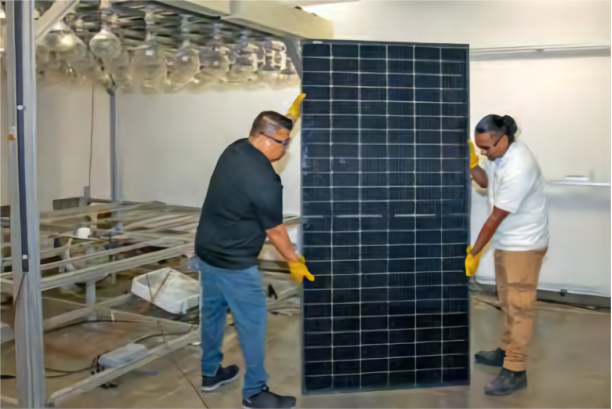
量子效率测试仪
PL/EL一体机
Sinton硅片少子寿命测试仪
Sinton硅块少子寿命测试仪
绒面反射率测试仪
3D共聚焦显微镜
在线四探针方阻测试仪
全自动扫描四探针方阻测试仪
在线薄膜厚度测试仪
晶化率测试仪
Horiba显微共焦拉曼光谱仪
傅里叶红外光谱仪
霍尔效应测试仪
分光光度计
全光谱椭偏仪
Horiba椭圆偏振光谱仪
TLM接触电阻率测试仪
超景深显微镜
网版智能影像测量仪
全自动影像测量仪
卧式拉力机
电池片稳态光衰老化试验箱
电池片紫外老化试验箱
电池片拉脱力综合测试仪
外观检验台
湿漏电测试系统
组件实验室EL测试仪
紫外老化试验箱
稳态光衰老化试验箱
电流连续性监测系统
PID测试系统
旁路二极管测试系统
LeTID测试系统
反向电流过载系统
脉冲电压测试系统
绝缘耐压测试仪
接地连续性测试仪
绝缘耐压接地测试仪
湿热环境试验箱
湿冻环境试验箱
热循环试验箱
动态机械载荷测试机
静态机械载荷测试机
冰雹冲击试验机
引出端强度试验机
霰弹冲击试验机
抗划伤(切割)测试机
剥离试验机
万能材料试验机(单臂)
万能材料试验机(双臂)
光伏玻璃透过率测试仪
醋酸测试试验箱
交联度测试系统
二极管接线盒综合测试仪
落球冲击试验机
半自动四探针
全自动探针式台阶仪
多通道太阳能MPPT系统
Horiba稳瞬态荧光光谱仪
大面积钙钛矿方阻椭偏二合一测试仪
大面积钙钛矿影像显微二合一监测站
钙钛矿P1激光划线测试仪
钙钛矿在线PL测试仪
钙钛矿在线方阻测试仪
钙钛矿在线膜厚测试仪
钙钛矿工艺检测工作站
手持式IV测试仪
便携式EL测试仪
手持热成像测试仪
户外组件多通道测试系统
光伏逆变器电能质量测试仪
无人机EL检测仪
IV测试仪
IVEL分选机
n型硅太阳能电池组件产品的紫外光衰(UVID)及可靠性评估
日期:2024-07-05浏览量:295
近年来,n型硅太阳能电池组件在紫外光照射下的性能变化(UVID)引起关注。2024年6月,美国RETC光伏测试实验室发布的报告显示,多个光伏项目中,组件自发玻璃破裂率达2%-5%,这是一种新型光伏故障。紫外光照射会导致n型硅太阳电池的光诱导衰减、光谱响应变化和辐照损伤,影响其电学性能和效率。为验证光伏组件在长期紫外光照射后的性能变化,美能紫外老化试验箱成为关键设备,测试EVA、硅胶、背板等高分子材料的耐久性,确保其符合IEC61215和IEC61730技术标准。

n型组件紫外光衰(UVID)
n型组件的紫外光衰(UVID)主要涉及到n型硅太阳能电池在紫外光照射下的性能变化。2024年6月,美国RETC光伏测试实验室发布了2024年度PV Module Index Report(光伏组件指数)初步报告。据调查,RETC 现场取证的几个容量约为100MW至300MW的大型公用事业光伏项目,组件自发的玻璃破裂率为2%-5%。NREL光伏可靠性和系统性能小组负责人Teresa Barnes表示,自发玻璃破裂是“此前从未见过的光伏故障”,从历史上看,这种类型的玻璃破碎通常是由于运维粗制滥造或运气不好如刮蹭到岩石,以及质量不好的薄膜光伏组件才会出现的。然而现在晶硅组件中的玻璃碎裂已经不足为奇。

n型组件的紫外光衰(UVID)主要涉及到n型硅太阳能电池在紫外光照射下的性能变化。从报告展示来看现代的太阳能电池架构,包括n型组件,对UVID较为敏感。
模块转换效率
RETC捕获光伏组件转换效率数据,作为其制造商CEC测试的一部分。标称模块转换效率是通过将产品在标准测试条件下的最大额功率除以其总孔径面积来确定的。虽然转换效率是光伏组件的关键优点,但在许多情况下,它也是光伏组件电池技术的功能。
根据报告显示,相较于传统的铝背面电场(Al-BSF)技术, 目前流行的p 型钝化发射器后接触器(p-PERC)光伏电池在零时刻提供了更好的初始效率。与此同时,n型隧道氧化物钝化接触(n-TOPCon ) 和n型硅异质结(n-HJT)光伏电池技术为制造商提供了未来甚至更高效率的产品设计的路线图。

光诱导衰减现象:根据的研究,n型晶体硅太阳电池在光照下会导致表面减反射膜SiN∶H/Si界面处积聚大量固定电荷,增大界面态密度,破坏电池表面钝化层结构。这导致开路电压和短路电流产生较大衰减,例如在35 kWh/m^2光辐照后n型硅太阳电池效率衰减3.6%。
光谱响应的变化:紫外-可见光谱分析表明γ辐照会导致导电玻璃变色,使得玻璃的透射率下降。虽然这是针对染料敏化太阳能电池的研究,但紫外光照射可能也会对n型硅太阳能电池的透射率产生影响,进而影响其性能。
辐照损伤效应:辐照损伤效应适用于n型硅太阳能电池。电子辐照剂量的增加会导致电池的短路电流密度和最大输出功率等电学参数显著降低。低剂量率下,当剂量达到200 kGy时,电池的最大功率下降了40%。
紫外老化试验箱
主要用于测试太阳组件的电池封装结构中,EVA、硅胶、背板、接线盒及线缆等高分子材料,这些高分子材料经过长期紫外光照射后,性能会发生变化。紫外老化测试系统,为了验证太阳能组件经过紫外光照后性能变化而设计
主要用于测试光伏组件高分子材料性能
多功能可定制
满足IEC61215.IEC61730技术条件
综上所述,n型硅太阳能电池组件在紫外光照射下的性能变化是影响其长期可靠性的重要因素。随着光伏技术的不断发展,对组件在不同环境条件下的性能进行深入研究显得尤为必要。紫外老化试验箱作为关键测试设备,为评估光伏组件高分子材料的耐久性提供了科学依据,确保其符合国际技术标准。未来,通过优化组件材料和制造工艺,可以进一步提高n型硅太阳能电池的抗紫外光衰性能,为光伏产业的可持续发展提供坚实保障。









































































